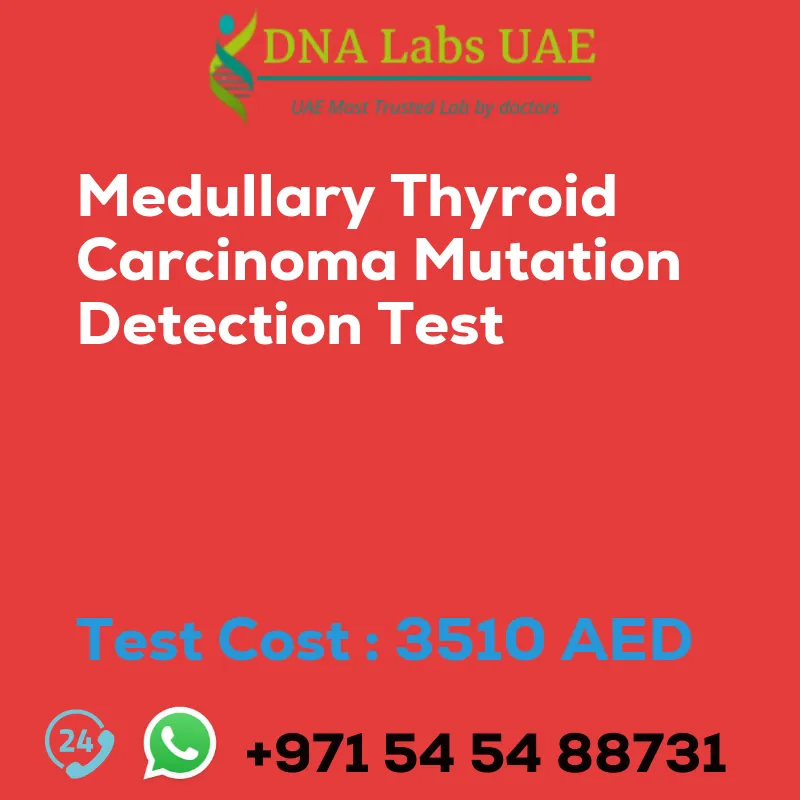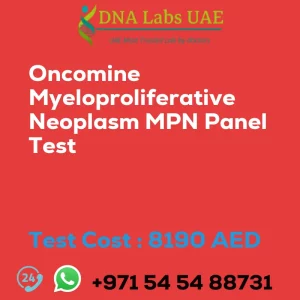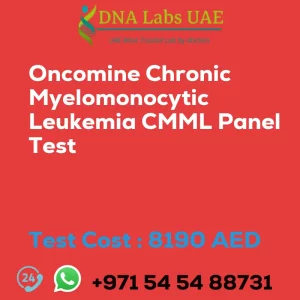MEDULLARY THYROID CARCINOMA MUTATION DETECTION Test
Test Cost: AED 3510.0
Symptoms, Diagnosis, and Test Details
The MEDULLARY THYROID CARCINOMA MUTATION DETECTION Test is a diagnostic test used to identify specific genetic mutations associated with medullary thyroid carcinoma (MTC). MTC is a rare type of thyroid cancer that originates from the C-cells of the thyroid gland.
The test analyzes a sample of the patient’s DNA, typically obtained from a blood or tissue sample. It specifically looks for mutations in the RET gene, which is known to be involved in the development of MTC. RET gene mutations are found in about 95% of hereditary cases of MTC and in about 45% of sporadic (non-hereditary) cases.
Detecting these mutations is important for several reasons. First, it helps confirm the diagnosis of MTC, as the presence of RET gene mutations is highly indicative of this type of cancer. Second, it can help determine the hereditary nature of MTC, as certain RET mutations are associated with familial cases of the disease. Finally, identifying specific mutations can guide treatment decisions, as some mutations may respond better to targeted therapies.
Test Components and Sample Condition
- Components: MEDULLARY THYROID CARCINOMA MUTATION DETECTION Test
- Price: AED 3510.0
- Sample Condition: 4 mL (2 mL min.) whole blood in 1 Lavender top (EDTA) tube. Ship refrigerated. DO NOT FREEZE.
- Duly filled Genomics Clinical Information Requisition Form (Form 20) is mandatory.
Report Delivery and Test Type
- Report Delivery: Sample Daily by 11 am; Report 10 Working days
- Method: PCR
- Test Type: Cancer
Doctor and Test Department
- Doctor: Oncologist
- Test Department: MOLECULAR DIAGNOSTICS
Pre Test Information
Duly filled Genomics Clinical Information Requisition Form (Form 20) is mandatory.
Important Notes
- This test specifically detects mutations associated with MTC and is not used to diagnose other types of thyroid cancer or non-cancerous thyroid conditions.
- The test is not typically performed as a routine screening test, but rather in individuals with suspected or confirmed MTC or a family history of the disease.
| Test Name | MEDULLARY THYROID CARCINOMA MUTATION DETECTION Test |
|---|---|
| Components | |
| Price | 3510.0 AED |
| Sample Condition | 4 mL (2 mL min.) whole blood in 1 Lavender top (EDTA) tube. Ship refrigerated. DO NOT FREEZE. Duly filled Genomics Clinical Information Requisition Form (Form 20) is mandatory. |
| Report Delivery | Sample Dailyby 11 am;Report 10 Working days |
| Method | PCR |
| Test type | Cancer |
| Doctor | Oncologist |
| Test Department: | MOLECULAR DIAGNOSTICS |
| Pre Test Information | Duly filled Genomics Clinical Information Requisition Form (Form 20) is mandatory. |
| Test Details |
The MEDULLARY THYROID CARCINOMA MUTATION DETECTION Test is a diagnostic test used to identify specific genetic mutations associated with medullary thyroid carcinoma (MTC). MTC is a rare type of thyroid cancer that originates from the C-cells of the thyroid gland. The test analyzes a sample of the patient’s DNA, typically obtained from a blood or tissue sample. It specifically looks for mutations in the RET gene, which is known to be involved in the development of MTC. RET gene mutations are found in about 95% of hereditary cases of MTC and in about 45% of sporadic (non-hereditary) cases. Detecting these mutations is important for several reasons. First, it helps confirm the diagnosis of MTC, as the presence of RET gene mutations is highly indicative of this type of cancer. Second, it can help determine the hereditary nature of MTC, as certain RET mutations are associated with familial cases of the disease. Finally, identifying specific mutations can guide treatment decisions, as some mutations may respond better to targeted therapies. The MEDULLARY THYROID CARCINOMA MUTATION DETECTION Test is typically ordered by a healthcare provider specializing in endocrinology or oncology. The test results are usually reported as either positive (indicating the presence of a mutation) or negative (indicating the absence of a mutation). In some cases, the test may also provide information about the specific type of mutation detected. It is important to note that this test specifically detects mutations associated with MTC and is not used to diagnose other types of thyroid cancer or non-cancerous thyroid conditions. Additionally, the test is not typically performed as a routine screening test, but rather in individuals with suspected or confirmed MTC or a family history of the disease. |








